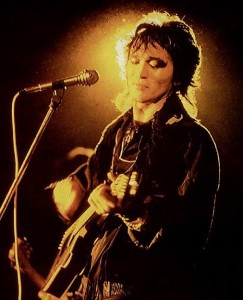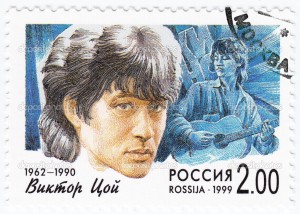Getting back to another of my favorite subjects relating to Russian culture and history—80’s pop music—I decided recently to write a complete translation of Хочу Перемен! (Khochu Peremen, Eng.= I Want Change!) a singular song of its time and place, by the russian band Kino (see also my translation of Kino’s Aluminum Cucumbers).
Перемен!- I Want Change!

Instead of warmth- greens of glass,
Instead of fire- smoke.
From the calendar grid a day is torn.
The red sun fires its entire mass,
The day is burned out by its stroke.
On the flaming city a shadow descends.
Change!- Demanded by our hearts,
Change!- Demanded by our eyes,
In our laughter and in our tears,
And in the pulse of veins
Change!
We wait for change.
Electric light extends our day
And the box of matches is empty.
But in the kitchen burns the blue flower gas.
Cigarettes in hands, tea on the table,
It is a simple scheme.
And there is nothing more, everything resides in us.
Change!- Demanded by our hearts,
Change!- Demanded by our eyes,
In our laughter and in our tears,
And in the pulse of veins
Change!
We wait for change.
We can not brag of wisdom in our vision
Or skillful gestures of the hand,
We don’t need all that to understand one another.
Cigarettes in hands, tea on the table,
So the circle is closed.
And suddenly we are afraid to change anything.
Change!- Demanded by our hearts,
Change!- Demanded by our eyes,
In our laughter and in our tears,
And in the pulse of veins
Change!
We wait for change.
On the face of it, this song succinctly expresses the mood of Russia in the 1980’s when the economy was falling apart and the legitimacy of the Communist Party’s claim to a monopoly on political power was in steep decline. My efforts to find discussions of this song by the author of its lyrics–Kino’s front-man Viktor Tsoy, who died in a car wreck in 1990–have so far proved fruitless. So some questions I have about the history of this song remain unanswered: To what extent was this song intended to be the anthem of dissent that it quickly became? Was this song in sympathy with, critical of as insufficient, or unconcerned with the reform efforts of Mikhail Gorbachev? What kind of changes, exactly, was Tsoy talking about—Political? Social? Personal?
These are the facts I know them: this song, which emphatically repeats the word “change” (or “changes.” This question of translation will be addressed below) again and again was written and first performed in the mid-1980’s, right around the time that Mikhail Gorbachev became First Party Secretary of the U.S.S.R.; the song became nationally known in 1997 when it appeared in the film Assa, directed by Sergei Soloviev; the 1980’s were, for better or worse, a time of great change for the Soviet Union, both in regards its domestic life and its relations with the outside world; Viktor Tsoy remains an important part of the cultural consciousness of Russia today, more than twenty years after his death. When I visited Saint Petersburg last year there were posters everywhere announcing the celebration of Tsoy’s fiftieth birthday. And more than once I saw street performers singing Kino songs, like the man with a guitar on the sidewalk along Nevsky Prospect across from Gostiniy Dvor covering this very song–I Want Change!
Here are some of the more interesting points reported in the most comprehensive treatments of this song that I was able to find online–Russian Wikipedia/Хочу_перемен!, and song-story.ru/peremen-kino:
-Tsoy always stressed that the song was not ‘a protest song.’
-The other members of the band did not especially like the song, and among themselves called it “dumpling” (the Russian word for a meat or vegetable filled dumpling, “pel’men,” sounds similar to “peremen”).
-The song was used as part of an elaborate protest action in Belarus in 2011 involving social media, and was subsequently banned from radio play by the Belorussian authorities.
-The music written by the band to accompany the lyrics was possibly inspired by the song ‘Barbarism Begins at Home,’ by the British rock group, The Smiths.
Notes on translation:
I at first tried to recreate the rhyming pattern of the original, but soon found that this could only be done at too great a sacrifice In terms of the imagery and the force of the words. I have, however, tried to preserve at least the meter/rhythm, which I think is especially important when translating a song.
The key word here, “перемен,” is the genitive plural form of the Russian word for “change”; in the song it is the object of sentences: “I want changes!”, “Our hearts demand changes,” “We wait for changes.” As there are no specific changes ever mentioned I have decided to translate this to the singular, “change,” but use it in its indeterminate form, as it was used, for example, as a slogan in Barack Obama’s presidential campaign.
Because Russian does not use articles, I believe the use of the plural in Russian could help differentiate this broad concept of “change” from a specific change. I have no evidence of this, but even without this my preference for the singular in English is also driven by the its greater impact, and that it sounds way better in the chorus, especially after the line that ends with the word “veins.”
Viktor Tsoy and Kino performing ‘Перемен’ (‘I Want Change’)
© 2013, John Dougherty. All rights reserved
